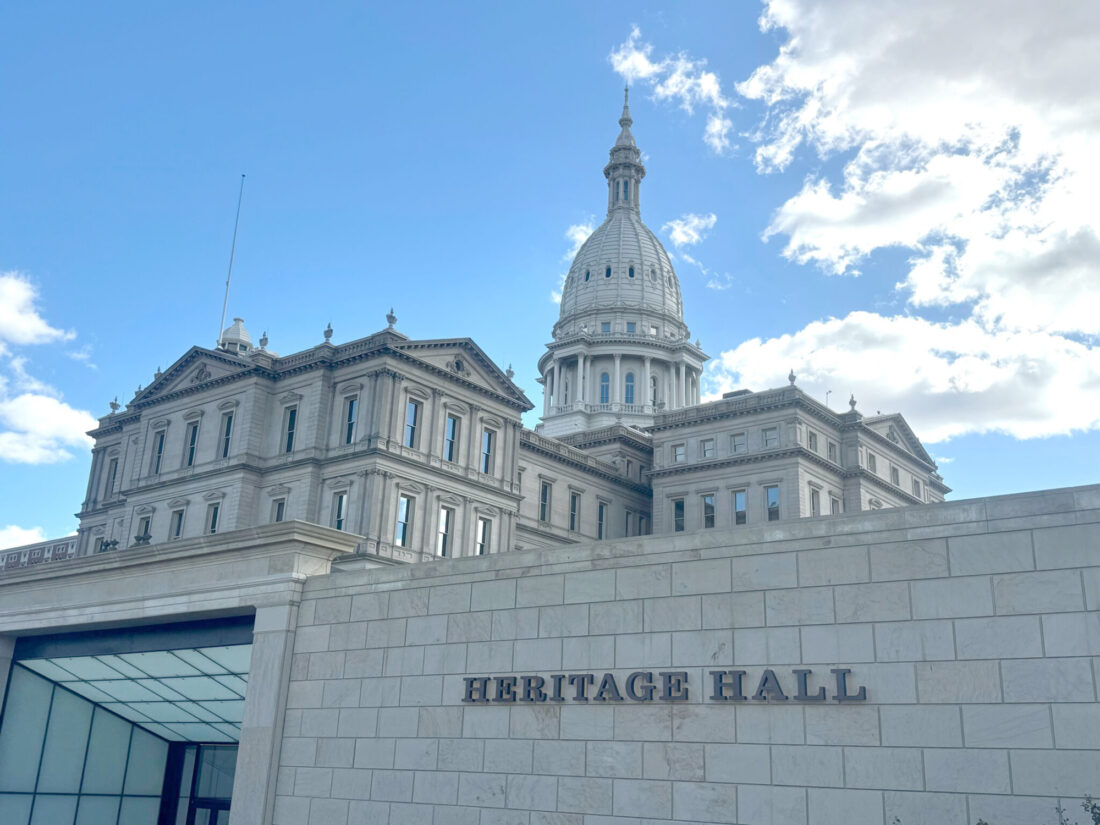State budget deal reached
But more work needed before Tuesday's deadline

The Michigan Capitol dome in Lansing. (Susan J. Demas)
A state budget framework for the 2025-26 fiscal year is in place, but now the tough work begins, with eyes on Tuesday to produce a final product.
Michigan’s Legislature and Gov. Gretchen Whitmer on Thursday evening announced they reached a deal to fund the government in a stunning turnaround after months of standoff and stalemate, signaling that the Republican-controlled House and the Democratic-led Senate worked out their differences and could move forward to avoid a government shutdown.
But the clock is still ticking and, by the respective chamber leaders’ own admission in statements that flew across newsfeeds late last night, there is much work still to be done to hammer out that framework into a full-fledged consensus budget plan.
The details of what might make the final plan were still elusive on Friday, even to some key legislators, as leadership on both sides of the aisle were keeping things close to the vest so as to not upset the agreement.
House Speaker Matt Hall, R-Richland Township, said as much in a news conference he had after session on Thursday, noting that he could not answer some important questions related to the deal because other key players were absent. Hall also noted that he didn’t want to say anything that might undo the progress made because it was still just a framework – which was atypical for the usually freewheeling speaker.
On the Senate side, details of the framework were also being closely held to vest, said state Sen. Jeff Irwin, D-Ann Arbor.
It was notable, too, that both the House and Senate had sessions on Friday but both were adjourned quickly without any clear new budget activity. A flurry of unrelated bills were introduced, instead, some with an appropriations focus, but those were for supplemental funding to programs that already exist.
Still, the lack of a quorum in the House and Senate shouldn’t be perceived as an early exit.
Communications staff for the House GOP told Michigan Advance on Friday that legislators were still very much meeting Friday to do additional work on the budget behind the scenes. That included conversations amongst themselves but also with their Democratic colleagues.
Democrats appeared to be fully engaged in those conversations as well, working at the Capitol and in the respective chamber office buildings negotiating targets and what they might look like. That includes hammering out the details of the school aid budget funding K-12 schools, which is another piece of vital budget information being held closely behind closed doors.
It was a whirlwind of activity after a lot of sitting around for months, but the conversations were bearing fruit and moving along.
The buzz in Lansing was hopeful that legislators would have a final deal hammered out to present on Tuesday, Sept. 30, the last day of the current fiscal year.
Of all the twists and turns of Thursday evening, the emergence of a plan to create a wholesale tax on marijuana at 24%, expected to generate $420 million to go toward roads, was an unforeseen development. Proposals to use “pot for potholes” stretched as far back as 2013, and now the House GOP of the 2025 session appeared to be the ones ready to take that plunge.
The House GOP also celebrated its “waste, fraud and abuse” mantra making it into the final budget deal.
For the Democrats’ part, there was barely a whisper of their supposed wins in the budget deal aside from the decoupling of Michigan’s state and the federal government’s business taxes, a move that would stave off some of the tax cut effects of the congressional One Big Beautiful Bill Act.
But one thing that was missed in Thursday’s announcement was the Democrats successfully protecting the statewide Medicaid exchange in the face of cuts from the federal government. Democrats on Friday touted that as another area where they won in the budget deal.
Another piece of information that caught the attention of those following the budget saga was a report from Bridge Michigan that noted interesting action from the Senate Democrats. The upper chamber’s leaders put forward an amendment on Thursday that would eliminate $500 million in annual funding for the Strategic Outreach and Attraction Reserve Fund, which was Whitmer’s hallmark economic development engine through the Michigan Economic Development Corporation.
Bridge also reported that the House GOP put forward a bill to cancel corporate income tax deposits to the fund, opting to use that money toward roads.
Spurring economic growth has been one area that both parties agreed on, even if they differed on the concept of offering state taxpayer dollars as incentives for business attraction that might not bear fruit. The move on Thursday regarding the reserve fund was a sign that both Democrats and Republicans saw a clear need to shift money away from past priorities, and that the use of those state incentives to garner new business activity might be falling out of vogue.
Irwin, in a brief interview with the Advance, said he was still concerned that funding for education, health care and environmental protection could be on the chopping block to cover road funding.
“I haven’t seen the final numbers yet, so I can’t say, but it looks like those things are all going to be subject to cuts as a result of the shift of revenue towards roads,” Irwin said.
While there will be other forms of revenue brought in to compensate for the increase in funding for roads, the rest will need to come from priority areas, and perhaps local governments.
“That’s kind of where it’s got to come,” Irwin said. “From some of those places. I guess it could come from prisons. … And so that’s concerning.”
Irwin was also critical of House Republicans’ plan to increase revenue by raising the tax on marijuana, arguing the effort would deliver less revenue than projected and would drive individuals toward the illegal market.
“When you drive customers out of the legal market, those are customers who are already contributing to roads, already contributing to K-12 schools, and already contributing to host communities. All of that’s going to be diminished by this action,” Irwin said.
As lawmakers met to solidify their loose deal, constituent and special interest advocacy continued on Friday.
In a news release from the pro-democracy Promote the Vote, the organization applauded the Legislature for getting to a deal, but urged lawmakers to protect election functions as critical infrastructure. The initial House GOP proposal included cuts to the Michigan Department of State and election administration.
Melanie Macey, the group’s policy and government affairs director, said those cuts would potentially threaten the state’s ability to run accessible, secure and efficient elections.
“They weaken election infrastructure and voter confidence, shift costs onto local governments, and would ultimately result in higher long-term costs,” Macey said in a statement. “The cuts would reduce early voting and Election Day support, damage election officials’ ability to provide required services, weaken voter roll maintenance and cybersecurity, and would have a disproportionate impact on vulnerable voters.”
Also releasing a statement was Rob Coppersmith, executive vice president of the Michigan Infrastructure & Transportation Association, who thanked Whitmer, Hall and Senate Majority Leader Winnie Brinks for their leadership in crafting a road funding plan.
“After decades of inaction, we finally have an agreement on a road funding deal that marks a historic step forward for Michigan. This bipartisan agreement is not only a significant investment in repairing and rebuilding our roads and bridges, it is also an investment in saving good-paying jobs and strengthening Michigan’s economy,” Coppersmith said. “While this is a historic step in the right direction, we know the work is not finished. Michigan must continue to make long-term, sustainable investments to keep our roads in good and fair condition for decades to come. This agreement lays the foundation for that future, and we look forward to working with Michigan’s leaders to build upon this progress.”
———
Michigan Advance is part of States Newsroom, a national 501(c)(3) nonprofit. For more, go to https://michiganadvance.com.




